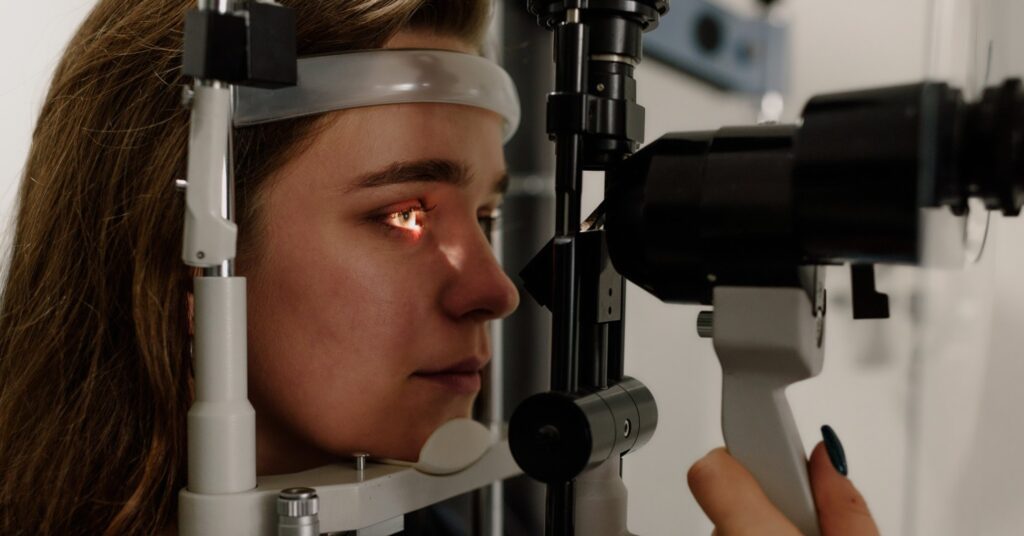
Why Become a Sports Vision Optometrist?
Sports vision optometrists work with patients at all levels, including [...]

Regardless of whether the labor market favors employers or job seekers, competition remains the driving force. So, it’s not surprising that people seek ways to stand out and establish themselves as highly competitive candidates for a position, raise, or promotion. Advanced degrees—official recognition of one’s expertise and dedication to a particular field—offer myriad benefits to professionals in this regard. Yet another way to prove one’s proficiency to employers, colleagues, and the public is to earn a certification from a leading professional organization. Most industries, including the field of optometry, offer some form of certification.
In this article, we look at board certification for optometrists and cover:
Many fields maintain their version of professional certification, a process by which practitioners pass an exam that proves their knowledge and skills and ability to maintain the field’s professional standards. At first glance, this seems like a non-controversial matter, but sometimes the need for professional certification is disputed.
During the 1999 House of Delegates session of the Congress of the American Optometric Association (AOA), a group representing several optometric organizations (including the AOA, the American Academy of Optometry, and the National Board of Examiners in Optometry (NBEO)) proposed the establishment of the American Board of Optometric Practice (APOB). Due to the rise of managed care organizations, ongoing healthcare reform, and the existence of boards for other medical specializations, many optometrists feared that their profession was being overlooked and their input ignored by insurers and legislators. Adherents asserted the APOB would elevate recognition of the practice and give them a seat at the table. APOB certification would be granted based on continuing education and fees.
The proposal was quite popular, but a minority strenuously opposed it, arguing that both existing state-level certifications and the prestige of earning a Doctor of Optometry and passing national board exams were sufficient. The opposition was strong enough that the idea was set aside, albeit temporarily. The American Board of Optometry (ABO) was established in 2009.
The ABO was immediately challenged by a group calling itself the American Optometric Society (AOS), which filed a lawsuit to halt proceedings. The ABO prevailed in August 2012, continuing its work to establish a national network for the profession. Despite its success, opposition has continued to erupt over time, largely around the costs of the continuing education requirements of both certification and recertification as well as the previously stated assertion that state boards negate the need for a national board.
Over time, optometry board certification has gained the legitimacy its proponents hoped for. While certification remains voluntary, it is highly regarded across the profession. It hasn’t hurt the cause that some health insurance providers require individual practitioners to be board certified to receive reimbursement for their services.
As for the certification itself, you can earn one from the ABO or an alternate certificate from the American Board of Certification in Medical Optometry (ABCMO). While both organizations offer certification for those in the field of optometric care, the ABO credential emphasizes maintenance of competency in general practice, while the ABCMO focuses on specialized competence. Some controversy exists regarding the relative value of these two credentials; that’s a subject for another article.
Board certification in optometry is only available to licensed optometrists—meaning those who hold a Doctor of Optometry degree (OD) from a program accredited by the Accreditation Council on Optometric Education (ACOE) and have passed the four-part exam administered by the National Board of Examiners in Optometry (NBEO). Any requirements beyond this depend on the state in which they practice. Some mandate additional classes and/or exams.
The primary benefits of certification boil down to two factors: satisfaction in the official recognition of your professional proficiency and the ability to land the jobs you desire as a result of that proficiency.
The first is reflected in such initiatives as the ABO’s Continuous Assessment Program, which replaced their requirement for a 10-year recertification exam and Maintenance of Certification (MOC) in 2018. Through a series of mini-assessments over three years, participants can learn about new advances in the field and updates to existing practices. Advocates of this initiative, particularly those who specialize in their practice, note that it enables them to sharpen general practice areas with which they may have become less familiar over time.
With regard to employability, it’s acknowledged across many industries that entering a job interview with a certification in hand burnishes the applicant’s qualifications in the eyes of hiring managers. Board certification not only improves your chances of landing your desired position but gives you an advantage when it comes time to negotiate promotions and raises.
As with all medical professions, you want to start preparing for your career as an undergraduate (if possible), loading your college transcript with relevant science classes like biology, chemistry, and anatomy. Obviously, you want to earn as high a GPA as possible, since this significantly improves your chances of acceptance to a college of optometry (preferably one accredited by the Council on Optometric Education). It’s also advantageous to demonstrate to prospective optometry programs your commitment to the profession by shadowing a licensed optometrist, which will also give you a real sense of the job.
For admission to optometry school, you must take—and perform well on—the Optometry Admission Test (OAT), which assesses your knowledge in four areas: physics, quantitative reasoning, reading comprehension, and science.
Assuming you’re accepted to an optometry program, you embark on a four-year course of study in subjects like biochemistry, anatomy, optics, physiology, diagnosis, and treatment. You’ll also undergo supervised clinical training. Once you’ve earned your Doctor of Optometry degree (OD), you can complete a one-year residency, particularly if you intend to enter a specialized field of patient care (e.g., pediatric optometry, vision therapy, contact lenses, low vision, etc.). Before you can start practicing, you need to pass the National Board of Examiners in Optometry test and any other state exams required for licensure.
Pursuing an advanced medical degree—no matter the area of medicine—is challenging. Students may wish to seek options to make this process a bit easier. They may choose to enroll in an online or hybrid program, like the one soon to be offered by the New England College of Optometry. While students are still required to engage in in-person clinical training, the online component of their studies gives them the flexibility to complete their coursework in a manner that best fits their lives.
(Last Updated on February 26, 2024)
Questions or feedback? Email editor@noodle.com

Sports vision optometrists work with patients at all levels, including [...]

Cornea and contact lens optometrists are highly educated practitioners; they [...]

The majority of our population will experience some level of [...]

The gift of old age is often coupled with physical [...]

Optometrists must obtain a Doctor of Optometry (OD) and adhere [...]
Categorized as: Optometry, Nursing & Healthcare